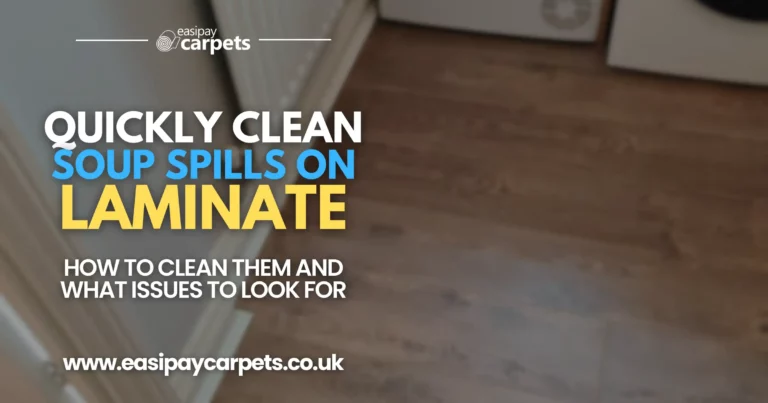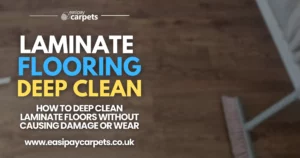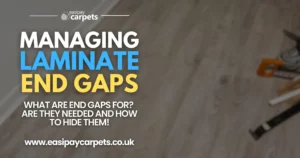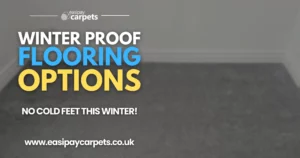

How To Quickly and Easily Clean Soup Spills From Laminate Flooring
Spilling soup on your laminate flooring can feel like a disaster waiting to happen, especially if it’s a hot, thick, or colourful variety. Laminate floors are designed to be durable and easy to clean, but they can be susceptible to damage if liquid spills are not dealt with promptly and correctly. If you’ve found yourself in this situation, don’t worry—this guide will show you how to clean soup spills from laminate flooring quickly and effectively to prevent stains, warping, or other damage.
Why It’s Important to Clean Spills on Laminate Flooring Quickly
Laminate flooring is made of multiple layers, with a protective wear layer on top and a core made of high-density fibreboard (HDF). While the top layer is designed to resist scratches and stains, the core is more vulnerable to moisture. If liquid spills like soup are left to sit, they can seep into the seams or cracks, leading to swelling, warping, and potentially permanent damage to the floor.
Acting quickly to clean up spills is crucial to maintaining the appearance and integrity of your laminate flooring.
Step-by-Step Guide to Cleaning Soup Spills on Laminate Flooring
Here’s a step-by-step guide to help you clean up soup spills on your laminate flooring and prevent any lasting damage:
Step 1: Act Immediately
The sooner you address a spill, the better. Grab a clean, absorbent cloth or paper towels and immediately blot up as much of the soup as possible. Avoid wiping at this stage, as that can spread the spill and push liquid into the seams of the flooring.
Step 2: Clean the Area with a Damp Cloth
Once you’ve blotted up the majority of the spill, dampen a cloth with warm water and gently wipe the area to remove any residue. Make sure the cloth is only damp, not soaking wet, to avoid adding excess moisture to the floor.
Step 3: Use a Mild Cleaner for Stubborn Stains
If the soup has left behind a stain, or if the spill included ingredients like tomato or oil that might be harder to remove, you may need to use a mild cleaner. Choose a cleaner specifically designed for laminate flooring, or make a DIY solution by mixing a few drops of dish soap with warm water.
- How to Apply: Dampen a cloth with the cleaning solution and gently wipe the stained area. Avoid using abrasive cleaners, as these can damage the protective layer of the laminate.
Step 4: Dry the Floor Thoroughly
After cleaning, it’s essential to dry the floor thoroughly. Use a clean, dry cloth to wipe down the area and remove any remaining moisture. You can also use a fan or open a window to help speed up the drying process. Ensuring the floor is completely dry will prevent any moisture from seeping into the seams and causing damage.
Step 5: Inspect the Area
Once the floor is dry, inspect the area to make sure the spill hasn’t left any lasting stains or damage. If you notice any warping, bubbling, or discolouration, you may need to take additional steps, such as replacing the affected planks.
Tips for Preventing Damage from Spills on Laminate Flooring
Preventing damage from spills is always easier than repairing it. Here are some tips to protect your laminate flooring from future spills:
Use Mats and Rugs in High-Risk Areas
- Place mats or rugs in areas where spills are more likely, such as under dining tables, in the kitchen, or in living areas where you might eat or drink. This will help catch spills before they reach the laminate.
Keep Cleaning Supplies Handy
- Having a clean cloth or paper towels nearby can make it easier to address spills immediately. Consider keeping a small cleaning kit in a convenient location so you can act fast when spills occur.
Avoid Excessive Moisture
- When cleaning your laminate floors, always use a damp—not wet—mop or cloth. Excessive moisture can damage the laminate and lead to issues like warping or bubbling.
Regularly Inspect and Maintain Your Floors
- Regularly check your laminate flooring for any signs of damage, especially after spills. Promptly addressing any issues can prevent them from worsening over time.
What to Do If the Spill Causes Damage
Even with the best care, accidents can happen, and spills might cause damage to your laminate flooring. If you notice any of the following issues after a spill, it’s important to take action:
Swelling or Warping: If the laminate planks have absorbed moisture and started to swell or warp, the affected planks may need to be replaced. It’s important to address the source of the moisture and replace the planks as soon as possible to prevent the damage from spreading.
Discolouration: Stains that won’t come out with regular cleaning may require a stronger laminate-specific cleaner or, in some cases, the replacement of the affected planks.
Bubbling or Lifting: If the laminate starts to bubble or lift at the edges, it’s a sign that moisture has gotten underneath the planks. This often requires the replacement of the damaged area to restore the floor’s appearance and functionality.
Conclusion
Cleaning soup spills from laminate flooring doesn’t have to be a stressful experience if you know the right steps to take. Acting quickly, using the appropriate cleaning methods, and ensuring the floor is thoroughly dried are key to preventing damage and keeping your laminate floors looking their best.
By following the tips in this guide, you can protect your laminate flooring from the effects of spills and maintain the beauty and durability of your floors for years to come. Remember, regular maintenance and prompt action are your best defences against the potential hazards of spills on laminate flooring.
Easipay Carpets can help you get brand new flooring without the high up-front cost – by simply letting you spread the cost of the flooring over time instead. There’s no interest on our plans so you aren’t spending a penny more than you would buying it outright and we include underlay, door trims, carpet grippers and laminate beading for free. Prices start from just £10 per week!
It starts with a free home appointment and quote, to get booked in at a time that suits you, tap the “Get Started” button below and fill out the contact form!
Still Got Questions? Here's 10 FAQs!
Yes, laminate flooring can be damaged by liquid spills if they are not cleaned up promptly. Moisture can seep into the seams, causing the planks to swell, warp, or discolour.
Start by blotting up the spill immediately with a clean cloth or paper towels. Then, clean the area with a damp cloth and a mild laminate floor cleaner, and dry the floor thoroughly.
If the spill leaves a stain, try using a mild laminate floor cleaner or a DIY solution of dish soap and warm water. Gently wipe the area and dry it thoroughly to prevent moisture damage.
No, steam mops are not recommended for laminate flooring as they can introduce too much moisture and potentially damage the floor. Stick to a damp cloth or mop instead.
If your laminate floor swells after a spill, it’s likely that the planks have absorbed moisture. You may need to replace the affected planks to restore the floor’s appearance and prevent further damage.
Use rugs or mats in high-risk areas, clean up spills immediately, and avoid excessive moisture when cleaning. Regularly inspect your floors for any signs of damage.
While diluted vinegar can be used to clean laminate flooring, it’s best to use a cleaner specifically designed for laminate to avoid damaging the protective wear layer.
After cleaning up a spill, use a dry cloth to remove any remaining moisture. You can also use a fan or open a window to help the area dry more quickly.
Yes, it’s best to use cleaners specifically formulated for laminate flooring to avoid damaging the surface. Avoid harsh chemicals and abrasive cleaners.
If your laminate flooring bubbles after a spill, it’s a sign that moisture has gotten underneath the planks. You may need to replace the affected area to restore the floor’s appearance and prevent further issues.




